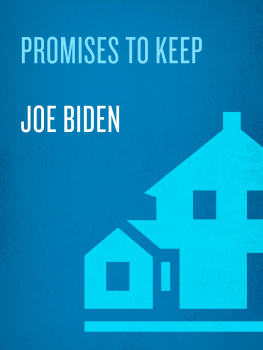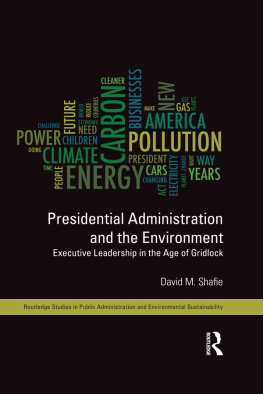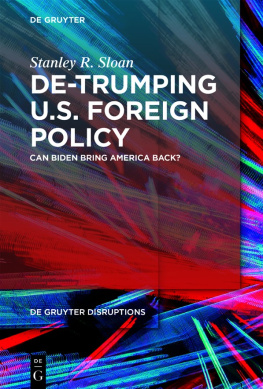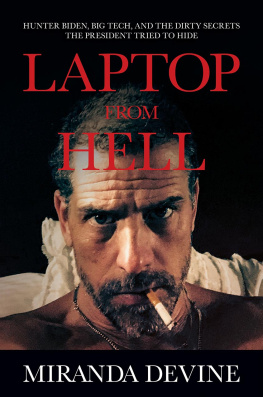www.amplifypublishing.com
Build Back Better: The First 100 Days of the Biden Administration, and Beyond
2021 Kelly Hyman. All Rights Reserved. No part of this publication may be reproduced, stored in a retrieval system or transmitted in any form by any means electronic, mechanical, or photocopying, recording or otherwise without the permission of the author.
Although the author and publisher have made every effort to ensure that the information in this book was correct at press time, the author and publisher do not assume and hereby disclaim any liability to any party for any loss, damage, or disruption caused by errors or omissions, whether such errors or omissions result from negligence, accident, or any other cause.
The views and opinions expressed in this book are solely those of the author. These views and opinions do not necessarily represent those of the publisher or staff.
For more information, please contact:
Amplify Publishing
620 Herndon Parkway #320
Herndon, VA 20170
ISBN-13: 978-1-63755-090-8
This book is dedicated to all the courageous single mothers out thereand to Charlton Heston, who gave me my first big break as an actor. Its also dedicated to my wonderful, supportive, and patient husband.
Contents
Prologue
People before Politics
After the mad rush of getting the manuscript of this book to my publisher, I had time (barely) to pause and think about the bigger picture. Writing about a presidents first one hundred days is all well and good, but what happens after that? One hundred days is not even seven percent of a four-year term. Surely, I thought, theres more to think about than the first pointof the first game and the first setof a tennis match!
Throughout the book, Ive tried to avoid keeping score, as if the outcome were only about my favorite teamrather than about issues that affect real people. But its hard not to be a spectatoror a cheerleader. I cant claim to be neutral. Im thrilled when a player volleys well, metaphorically, and Im heartbroken when they double-fault. In todays media-obsessed culture, its all too easy to get caught up in the Grand Slam and forget that there are actual people involvedpeople who are not playing some game. Theyre just trying to live their lives and sometimes getting slammed themselves. With all my heart, I want this book to be for them. What happened in Bidens first hundred daysand what will happen in his next 1,361is about people, not politics.
Am I Better Off?
In 1980, Ronald Reagan asked the now-famous rhetorical question, Are you better off now that you were four years ago? At the time, our country had experienced rising prices, wage stagnation, double-digit interest rates, and impossibly long lines at the gas station. With a single question, President Carter was tagged as the culprit, and he eventually lost the election.
Ever since then, that phrase has been usedand spun furiouslyby politicians on either side. Its a handy shortcut for blaming a candidate or a party in power for whatever misfortunesreal or imaginedpeople may feel at the moment. As such, it has become a clich, and a cynical one at that. But I propose we start using Reagans question, Am I better off? in a different way:
Not: Who can I blame for the problems Im having now?
But instead: What is being done to make things better?
The rules for rephrasing his question apply to Republicans, Democrats, and independents alike. Rather than demonizing or deifying the policy makers, the rule is to look at the policy first. Does it actually do something that improves the situationfor you and those you love, certainly, but also for those you dont know?
Lets take the COVID-19 pandemic as an example, even though its not over yet. Rather than demonize President Trump or deify President Biden for the current trajectory, lets take a hard look at the policy we have now. Did it help, who did it help, and who may be helped down the road? To be sure, the struggle to pass the relief plan was extremely partisan. But even this early in the process, the answer to the question Am I better off? (when compared to the past six months) is mostly, Yes. A majority of Americans are positive about the COVID-19 relief planto a degree that even some Republicans who voted against the plan have touted its benefits, like Florida Representative Maria Salazar and Mississippi Senator Roger Wicker, who lauded the packages small business relief measures despite their opposition to the bill in the House and Senate.
The same should apply to all the policies outlined in this book. Whether its Bidens jobs and infrastructure plan, the recently-proposed support for American families, or initiatives on justice, equity, immigration, voting rights, or foreign policy, its not about the policy maker, but the policy itself. The question should always be, Does this make things better? not Who can I blame? Consider this book as a lensnot a scorecardfor viewing the next four years.
As the late author and motivational speaker Wayne Dyer once said, If you change the way you look at things, the things you look at change.
Acting In Our Own Best Interest
It always pains me when someone acts against their own best interests, but its a sad fact of life. For whatever reasons, people follow a personality, or a brand, that promises something better for their lives. When in distress, people are more likely to pick easy-sounding solutions, even when we know, deep down, that they wont solve the problem. For generations, down-and-out Americans have gravitated to political extremes rather than look at the big picture.
With the 2022 midterms approaching, the gravitational pull will be strong. Politics and simple solutions will aboundtempting us to watch the score but ignore what it means to actual people, including ourselves. An early example is the flurry of new election laws in southern stateseven those with admittedly fair and efficient outcomes, such as Florida and Texas. However, rather than focus on the political rhetoric of these new election laws, we should be asking what their effect will be on peoplespecifically older retirees, the poor, minorities, and overseas military personnel who will find it more difficult to vote. There should be a real discussion, not a political scrum, about the impact of the proposed For the People act.
At the end of the day, the Build Back Better agenda has to be about ordinary peoples lives, not the noise politicians make. If any of the policies outlined in this book speak to you and your own pursuit of happiness, then its your job to not wait for 2022 (or 2024). Letting your representative know what it means to you is the first step, a way to act in your own best interests, no matter what team youre rooting for.
If we do that, I passionately believe we can become the country we all want it to be. No matter if were white, Black, Asian, or otherno matter what gender or income group or social classwell be better Americans.











